新目标英语连结词
英语发言稿的连接词有哪些
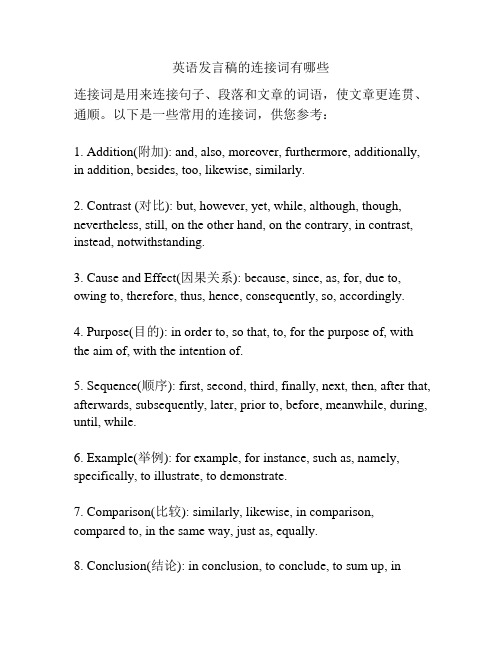
英语发言稿的连接词有哪些连接词是用来连接句子、段落和文章的词语,使文章更连贯、通顺。
以下是一些常用的连接词,供您参考:1. Addition(附加): and, also, moreover, furthermore, additionally, in addition, besides, too, likewise, similarly.2. Contrast (对比): but, however, yet, while, although, though, nevertheless, still, on the other hand, on the contrary, in contrast, instead, notwithstanding.3. Cause and Effect(因果关系): because, since, as, for, due to, owing to, therefore, thus, hence, consequently, so, accordingly.4. Purpose(目的): in order to, so that, to, for the purpose of, with the aim of, with the intention of.5. Sequence(顺序): first, second, third, finally, next, then, after that, afterwards, subsequently, later, prior to, before, meanwhile, during, until, while.6. Example(举例): for example, for instance, such as, namely, specifically, to illustrate, to demonstrate.7. Comparison(比较): similarly, likewise, in comparison, compared to, in the same way, just as, equally.8. Conclusion(结论): in conclusion, to conclude, to sum up, insummary, in brief, ultimately, finally.9. Emphasis(强调): indeed, of course, certainly, without a doubt, undoubtedly, unquestionably, especially, particularly, specifically, significantly.10. Clarification(解释): that is, in other words, to put it simply, to clarify.11. Time(时间): before, after, while, when, as soon as, whenever, until, since, meanwhile, during, now, then, finally.12. Place(地点): here, there, nearby, elsewhere, above, below, beyond, opposite, nearby, adjacent.13. Addition(补充): besides, in addition, moreover, furthermore, further, what’s more, also.14. Contradiction(矛盾): but, however, yet, although, even though, despite, in spite of, on the other hand, whereas, conversely.15. Result(结果): therefore, thus, as a result, hence, consequently, accordingly, so, then.16. Condition(条件): if, unless, provided that, as long as, whether, in case, on condition that.17. Reason(原因): because, since, as, due to, owing to, on account of, for.18. Time(时间): first, second, third, next, then, finally, afterwards, subsequently, and, or, while, before, after.19. Intensification(加强): extremely, absolutely, totally, completely, utterly, particularly, fully, strongly, deeply, fiercely.20. Acknowledgment(承认): admittedly, undeniably, of course, naturally, certainly, granted, to be sure, indeed, most certainly.21. Concession(让步): although, though, even though, even if, while, granted, it is true that, in spite of, despite, regardless.22. Reformulation(重新表述): in other words, to put it another way, that is to say, in simpler terms, to clarify, to restate.这些连接词可帮助您在发言稿中使文句更流畅,内容更连贯。
英语周报新目标参考答案

英语周报新目标参考答案在本周的英语周报中,我们提供了一系列的练习题和阅读材料,旨在帮助学生提高英语水平,达到新目标。
以下是针对本周英语周报的参考答案,供同学们参考和学习。
一、词汇练习1. 根据上下文,选择正确的单词填空。
- The _______ (inventor/invention) of the telephone was Alexander Graham Bell.- Answer: inventor2. 将下列单词与它们的定义配对。
- A. Advocate - 支持者- B. Chronicle - 编年史- C. Diverse - 多样化的- Answer: A - 支持者, B - 编年史, C - 多样化的3. 根据句子的意思,填写适当的单词。
- Despite the _______ (challenge), she managed to complete the marathon.- Answer: challenge二、语法练习1. 将下列句子改为被动语态。
- The company will launch a new product next month.- Answer: A new product will be launched by the companynext month.2. 使用正确的时态填空。
- She _______ (be) very tired after the long journey.- Answer: was3. 选择正确的连接词填空。
- I would have helped you, _______ you hadn't told me you were busy.- Answer: if三、阅读理解Passage 1: The Benefits of ReadingReading is a fundamental skill that offers numerous benefits. It not only enhances vocabulary and comprehension but also stimulates the brain, leading to improved cognitive abilities. According to recent studies, regular readers have been foundto have better memory and concentration. Moreover, readingcan be a source of relaxation, providing an escape from the stresses of daily life.Questions:1. What are some benefits of reading mentioned in the passage? - Answer: Enhanced vocabulary, improved comprehension, stimulated brain, better memory, and concentration.2. Why can reading be considered a source of relaxation?- Answer: It provides an escape from the stresses of daily life.Passage 2: The Impact of Technology on EducationThe integration of technology in education has revolutionized the way students learn. With the advent of online learning platforms, students can access a wealth of information and resources at their fingertips. However, this has also raised concerns about the potential negative effects, such as decreased face-to-face interaction and the risk of information overload.Questions:1. What is one positive impact of technology on education?- Answer: Access to a wealth of information and resources.2. What concerns does the integration of technology in education raise?- Answer: Decreased face-to-face interaction and the risk of information overload.四、写作练习Write an essay on the topic: "The Role of Technology in Modern Society."Answer:In modern society, technology plays an integral role in almost every aspect of our lives. From communication to transportation, technology has streamlined processes and made our lives more efficient. It has also opened up new avenues for learning and entertainment, making information moreaccessible than ever before. However, it is crucial tobalance the benefits of technology with its potential drawbacks, such as privacy concerns and the digital divide.As we continue to embrace technological advancements, it is essential to ensure that they are used responsibly andethically for the betterment of society.五、听力练习Listening Exercise 1: Understanding ConversationsYou will hear a conversation between two friends discussing their weekend plans. Answer the following questions based on what you hear.1. What are the friends planning to do this weekend?- Answer: They are planning to go hiking and have a picnic.2. What time are they leaving for their trip?- Answer: They are leaving at 8:00 AM.Listening Exercise 2: News ReportListen to a news report about a new technological breakthrough. Answer the following question.1. What is the main topic of the news report?- Answer: The main topic is a new technological breakthrough in renewable energy.六、口语练习Role-play a conversation between a customer and a shop assistant. The customer wants to return a product they arenot satisfied with.Customer: Excuse me, I bought this item last week, but it'snot working properly. I'd like to return it.Assistant: Of course, I'd be happy to help. Could you please show me the receipt and the item?Customer: Here's the receipt. I've tried using it, but it keeps malfunctioning.Assistant: I apologize for the inconvenience. Let me checkour return policy. Yes, you are within the return period.I'll process the return for you right away.Customer: Thank you for your help.Assistant: You're welcome. We hope to serve you better next time.通过上述参考答案,希望能够帮助同学们更好地理解英语周报的内容,并在英语学习。
英语作文常用连接词(层次,因果等等)
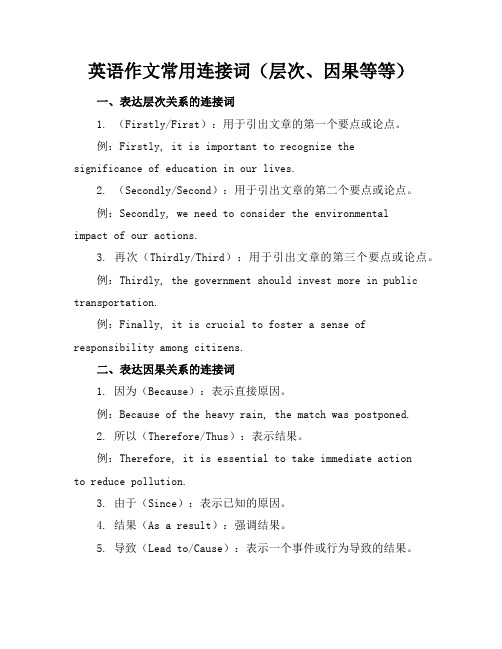
英语作文常用连接词(层次、因果等等)一、表达层次关系的连接词1. (Firstly/First):用于引出文章的第一个要点或论点。
例:Firstly, it is important to recognize thesignificance of education in our lives.2. (Secondly/Second):用于引出文章的第二个要点或论点。
例:Secondly, we need to consider the environmentalimpact of our actions.3. 再次(Thirdly/Third):用于引出文章的第三个要点或论点。
例:Thirdly, the government should invest more in public transportation.例:Finally, it is crucial to foster a sense of responsibility among citizens.二、表达因果关系的连接词1. 因为(Because):表示直接原因。
例:Because of the heavy rain, the match was postponed.2. 所以(Therefore/Thus):表示结果。
例:Therefore, it is essential to take immediate actionto reduce pollution.3. 由于(Since):表示已知的原因。
4. 结果(As a result):强调结果。
5. 导致(Lead to/Cause):表示一个事件或行为导致的结果。
例:The increase in population leads to a higher demandfor housing.通过熟练运用这些连接词,你的英语作文将更具逻辑性和条理性,使读者更容易理解和跟随你的思路。
英语作文常用连接词新编

英语作文常用连接词新编Company number【1089WT-1898YT-1W8CB-9UUT-92108】英语作文常用连接词(一)连接词(1)表选择关系或对等关系的连接词:either…or…,neither…nor, o r,a s w e l l a s…,a n d,b o t h…a n d…。
(2)表因果关系或对等关系的连接词:therefore, so, as a result, as the result of …,because of, due to …,owing to, thanks to 等。
(3)表时间顺序的连接词:the moment, as soon as, at first, then, later, meanwhile, at the beginning, in the end, before long, f o r t h e f i r s t(s e c o n d…)t i m e,t h e m i n u t e等。
(4)表转折关系的连接词:yet, and yet, but , while, on the contrary, on the other hand, however, at the same time(然而)等。
(5)表解释说明的连接词:that is, that is to say, in other words, such as, for instance, and so on, etc. and the like等。
(6)表递进关系的连接词:not only…but (also), what,s more, what's worse, besides, in addition, worse still, moreover, a b o v e a l l等。
(7)表示总结的连接词:in a word, on the whole, in short, b r i e f l y,i n b r i e f,t o s u m u p,i n a l l等。
新概念第二册连词重点汇总一览表

新概念第二册连词重点汇总一览表
本文档旨在总结新概念英语第二册中的连词重点,以帮助读者更好地掌握英语连词的用法与表达。
以下为重点汇总:
一、并列连词
- and
常用于列举同类事物或废话后转入正题。
- but
常用于转折,两个分句的意思相反,但通常只有前面的分句表述完整。
- or
常用于表达选择、两者之中的一个,也可用于列举同类事物中的最后一个。
二、条件连词
- if
常用于表示条件、假设、可能性等,引导条件从句。
- unless
表示否定条件,通常与否定词连用。
- so long as/as long as
意为“只要”,引导条件从句。
三、让步连词
- though/although
表示让步,引导让步状语从句。
- while/whilst
表示对比,引导对比状语从句。
四、时间连词
- when
表示时间状语从句,通常与一般过去时或过去进行时连用。
- until/till
表示某个时间之前,引导时间状语从句。
五、原因连词
- because/since/as
表示原因,引导原因状语从句。
- for
也可表示原因,但通常放在句首或句中,不引导从句。
本文仅为常用连词的简要总结,更多细节请参见第二册教材。
希望本文能对读者在英语学习中有所帮助。
新目标九年级Unit1课文总结及练习题附答案
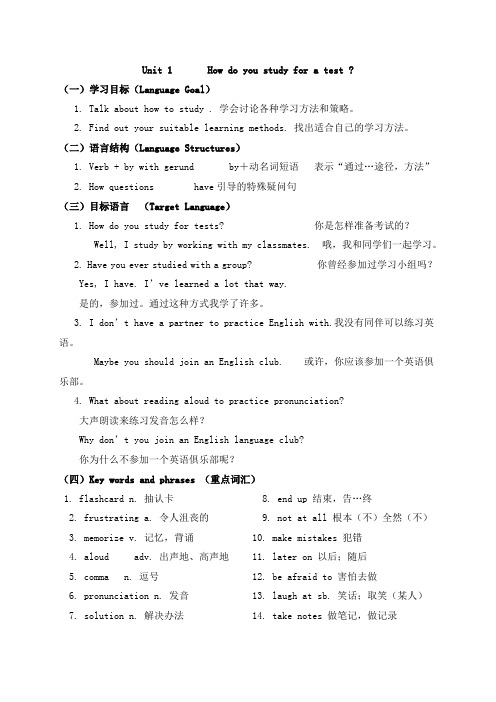
Unit 1 How do you study for a test ?(一)学习目标(Language Goal)1. Talk about how to study . 学会讨论各种学习方法和策略。
2. Find out your suitable learning methods. 找出适合自己的学习方法。
(二)语言结构(Language Structures)1. Verb + by with gerund by+动名词短语表示“通过…途径,方法”2. How questions have引导的特殊疑问句(三)目标语言(Target Language)1. How do you study for tests? 你是怎样准备考试的?Well, I study by working with my classmates. 哦,我和同学们一起学习。
2. Have you ever studied with a group? 你曾经参加过学习小组吗?Yes, I have. I’ve learned a lot that way.是的,参加过。
通过这种方式我学了许多。
3. I don’t have a p artner to practice English with.我没有同伴可以练习英语。
Maybe you should join an English club. 或许,你应该参加一个英语俱乐部。
4. What about reading aloud to practice pronunciation?大声朗读来练习发音怎么样?Why do n’t you join an English language club?你为什么不参加一个英语俱乐部呢?(四)Key words and phrases (重点词汇)1. flashcard n. 抽认卡2. frustrating a. 令人沮丧的3. memorize v. 记忆,背诵4. aloud adv. 出声地、高声地5. comma n. 逗号6. pronunciation n. 发音7. solution n. 解决办法8. end up 结束,告…终9. not at all 根本(不)全然(不)10. make mistakes 犯错11. later on 以后;随后12. be afraid to 害怕去做13. laugh at sb. 笑话;取笑(某人)14. take notes 做笔记,做记录15. enjoy doing sth. 喜欢做…乐意做…16. native speaker 说本族语的人17. make up 组成、构成(五)重点、难点:(Key points and difficulties)1. by 介词,表示“通过…方法或途径”的意思,译成“靠、通过”by后面可以加名词或动名词短语,eg.(1)The house was destroyed by fire. 房屋被火烧毁了。
英语中常用的连接词

英语中常用的连接词1.表示罗列增加:First, second, third, First, then / next, after that / next,finally For one thing … for another…, On (the) one hand…on theother hand, Besides / what's more / in addition / furthermore /moreover / another / also, Especially / In particular,2.表示时间顺序:now, at present, recently, after, afterwards, after that, after a while, in a few days, at first, in the beginning, to begin with,later, next, finally, immediately, soon, suddenly, all of a sudden,at that moment, as soon as, the moment form now on, from then on,at the same time, meanwhile, till, not…until, before, after, when,while, as during,3.表示解释说明:now, in addition, for example, for instance, in this case, moreover furthermore, in fact, actually4.表示转折关系:but, however, while, though, or, otherwise, on the contrary, on theother hand, in contrast, despite, in spite of, even though, except (for),instead, of course, after all,5.表示并列关系:or, and, also, too, not only … but also, as well as, both… and,either …or, neither …nor, for6.表示因果关系:because, because of, since, now that, as, thanks to…, due to…,therefore, as a result (of), otherwise, so…that, such…that7.表示条件关系:as (so) long as, on condition that, if, unless, once, when8.表示让步关系:though, although, as, even if, even though, whether …or…, however,whoever,whatever, whichever, wherever, whenever, no matter how (who, what,which, where, when, whom)9.表示举例:for example, for instance, such as…, take… for example10.表示比较:be similar to, similarly, the same as, in contrast, compared with(to)…just like, just as,11.表示目的:for this reason,, for this purpose, so that, in order to, so as to,12.表示强调:in deed, in fact, surely, certainly, no doubt, without any doubt,truly, obviously, above all,13.表示概括归纳:on the whole, to sum up, generally speaking, in my opinion, as far asI know, as we all know, as has been stated, as I have shown, finally,at last, in summary, in conclusion.。
2023新人教版高一英语必修二连词表

2023新人教版高一英语必修二连词表---连词是英语语法中重要的一部分,它们连接短语、句子和段落,使得句子和段落之间的关系更加清晰明了。
掌握不同的连词用法,能够帮助我们更好地理解和运用英语。
下面是2023新人教版高一英语必修二中常用的连词表。
一、并列连词(Coordinating Conjunctions)并列连词用于连接两个平等的句子、短语或单词。
常见的并列连词有以下几种:1. and:和,以及and:和,以及2. but:但是but:但是3. or:或or:或4. for:因为for:因为5. nor:也不nor:也不6. so:所以so:所以例如:- I like coffee and tea.(我喜欢咖啡和茶。
)and tea.(我喜欢咖啡和茶。
)- She studied hard, but she failed the exam.(她研究很努力,但是考试没通过。
)but she failed the exam.(她学习很努力,但是考试没通过。
)- We can choose to travel by train or by plane.(我们可以选择坐火车或者坐飞机旅行。
)or by plane.(我们可以选择坐火车或者坐飞机旅行。
)- He missed the bus, so he had to walk to work.(他错过了公交车,所以他不得不步行去上班。
)so he had to walk to work.(他错过了公交车,所以他不得不步行去上班。
)二、从属连词(Subordinating Conjunctions)从属连词用于连接主句和从句,从句依赖于主句,不能独立存在。
常见的从属连词有以下几种:1. if:如果if:如果2. unless:除非unless:除非3. when:当when:当4. while:当...的时候while:当...的时候5. because:因为because:因为6. although:尽管although:尽管7. since:因为since:因为8. until:直到until:直到例如:- If it rains tomorrow, we will stay at home.(如果明天下雨,我们将待在家里。
人教版新目标九年级英语上册Unit-3-知识点归纳

人教版新目标九年级英语上册Unit 3 知识点归纳1.取钱get some money2。
买一些杂志/邮票get/buy some magazines3.获取一些有关小镇的信息get some information about the town4.买一双鞋get/buy a pair of shoes5.买一份报纸buy a newspaper6.买一本字典buy a dictionary7。
买一些有票buy some stamps8。
吃饭have dinner9。
怎样到达…how to get to sp10。
沿着go along/ go down11.在银行的旁边beside the bank12。
在右边on the right/left13.在某人的右边on one’s right14。
去三楼go to the third floor15.向左转turn left/ right16.在…之间between …and…17.走过书店go past the bookstore18。
做…激动be excited to do sth.19.从/以…开始start/ begin with20.不必匆忙not need to rush21。
有……独特之处be special about.. 。
22。
加油,过来come on23.休息室 a room for resting24。
请再说一次pardon me25.抓住某人的手hold one’s hand26.摇滚乐队 a rock band27。
起初at first28。
在去...。
.。
的路上on one’s way to。
29。
经过、路过pass by30.开始玩start playing31.沿... 走;走上;走近walk up32.在门边at the door33.在门旁by the door:34.在那个时刻at that time35。
来得更早点come a little earlier36。
初中英语 人教版新目标九年级全册——单元语法精讲专练 unit2 (word版 含答案)
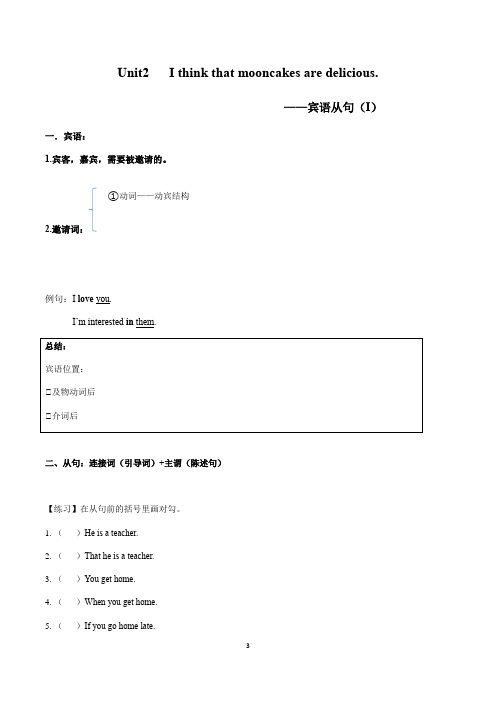
Unit2 I think that mooncakes are delicious.——宾语从句(I )一.宾语:1.宾客,嘉宾,需要被邀请的。
2.邀请词:例句:I love you.I’m interested in them.二、从句:连接词(引导词)+主谓(陈述句)【练习】在从句前的括号里画对勾。
1. ( )He is a teacher.2. ( )That he is a teacher.3. ( )You get home.4. ( )When you get home.5. ( )If you go home late.①动词——动宾结构6.()How you learn English.7.()Where you will go.8.()Whether you go to Beijing.9.()Who is he?10.()Who he is.11.()How old your father is.12.()How old is your father.你都确认对了吗?接下来,我们来正式认识一下宾语从句。
宾语从句一、定义:在主从复合句中,做主句宾语作用的句子。
例句:He said that he didn’t know it.I am interested in what he says.I am sure (that) he will come.二、3个注意事项1.连接词【转化步骤】例句11:What is Kate’s hobby?确定连接词→ what变为从句:恢复陈述语序→What Kate’s hobby is.添加主句:→Tom wonders what Kate’s hobby is.例句12:What color does Kate like?确定连接词→ What color变为从句:恢复陈述语序→What color Kate likes.添加主句:→Tom wonders what color Kate like s.例句13:Who drove Kate home yesterday?确定连接词→ who变为从句:恢复陈述语序→Who drove Kate home yesterday.添加主句:→Tom wonders who drove Kate home yesterday.例句14:How does Kate go to work every day?确定连接词→ how变为从句:恢复陈述语序→How Kate goes to work every day.添加主句:→Tom wonders how Kate goes to work every day.2.时态(宾语从句的时态受主句的限制)3.从句语序:连接词+主语+谓语+其他成分【陈述句语序语序】先主语后谓语动词。
初中英语语法大全及新目标初中英语总复习资料精品讲义
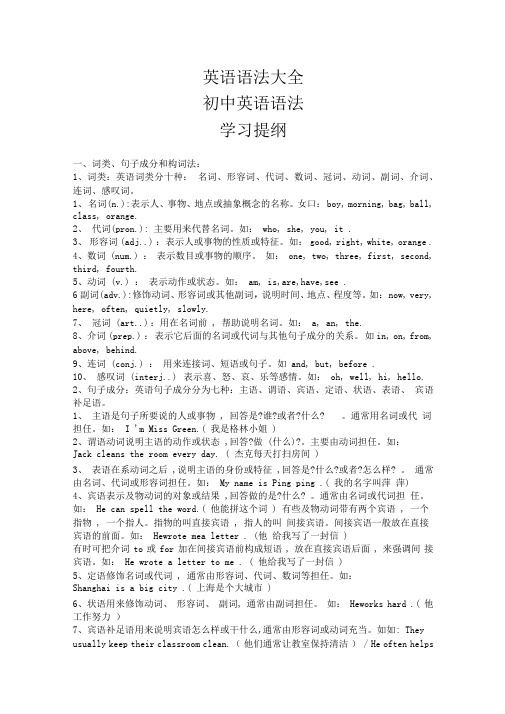
英语语法大全初中英语语法学习提纲一、词类、句子成分和构词法:1、词类:英语词类分十种:名词、形容词、代词、数词、冠词、动词、副词、介词、连词、感叹词。
1、名词(n.):表示人、事物、地点或抽象概念的名称。
女口:boy, morning, bag, ball, class, orange.2、代词(pron.): 主要用来代替名词。
如: who, she, you, it .3、形容词(adj..) :表示人或事物的性质或特征。
如:good, right, white, orange .4、数词 (num.) :表示数目或事物的顺序。
如: one, two, three, first, second, third, fourth.5、动词 (v.) :表示动作或状态。
如: am, is,are,have,see .6副词(adv.):修饰动词、形容词或其他副词,说明时间、地点、程度等。
如:now, very, here, often, quietly, slowly.7、冠词 (art..) :用在名词前 , 帮助说明名词。
如: a, an, the.8、介词(prep.) :表示它后面的名词或代词与其他句子成分的关系。
如in, on, from, above, behind.9、连词 (conj.) :用来连接词、短语或句子。
如 and, but, before .10、感叹词 (interj..) 表示喜、怒、哀、乐等感情。
如: oh, well, hi, hello.2、句子成分:英语句子成分分为七种:主语、谓语、宾语、定语、状语、表语、宾语补足语。
1、主语是句子所要说的人或事物 , 回答是?谁?或者?什么? 。
通常用名词或代词担任。
如: I 'm Miss Green.( 我是格林小姐 )2、谓语动词说明主语的动作或状态 ,回答?做 (什么)?。
主要由动词担任。
如:Jack cleans the room every day. ( 杰克每天打扫房间 )3、表语在系动词之后 ,说明主语的身份或特征 ,回答是?什么?或者?怎么样? 。
新版新目标英语九年级unit2知识点总结
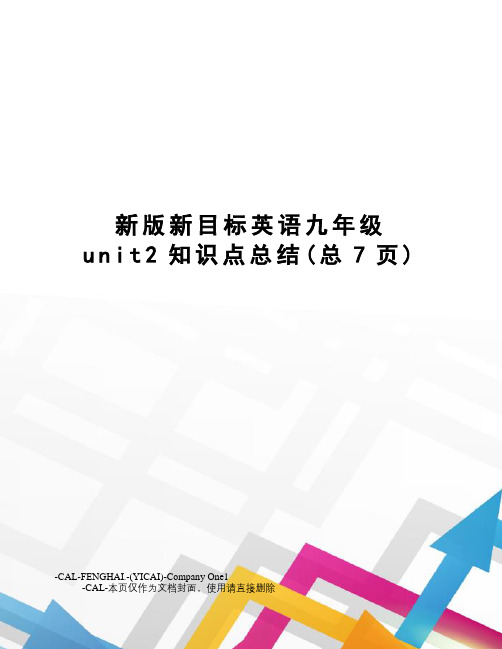
新版新目标英语九年级u n i t2知识点总结(总7页)-CAL-FENGHAI.-(YICAI)-Company One1-CAL-本页仅作为文档封面,使用请直接删除Unit2 I think that mooncakes are delicious!1.crowded 形容词,拥挤的 be crowded with 被….挤满2.wonder v想知道相当于want to know(1)后接who, what, why等连接词引导的宾语从句及“疑问词+动词不定式”结构时,想知道I wonder who that boy is.(2)后接if 或whether 引导的从句时,表示一种委婉的请求或疑问,I wonder if I could use your mobile phone.(3)后接that引导的宾语从句以及动词不定式短语时,(对….)感到惊讶I wonder to see her looking so cheerful.(4)wonder n奇迹,奇观 What are the Seven Wonders in the world?(5)wonderful 形容词3.whether 与 if(1)引导宾语从句意为是否,可以互换。
(2)引导宾语从句时,whether可直接与or not 连用,而if不可以。
I don’t know whether or not I should go.(3)if引导条件状语从句,如果,而whether不可以。
If i t doesn’t rain tomorrow, we will go camping.4. go to…for a/one’s vacation 去….度假(假期还没有开始) go on vacation 在度假holiday假日 vacation假期(1)对于英国人或者澳大利亚人来说,“假日”的意思等同于“假期”经常用holiday.(2)对美国人,“假日”是指一个特殊的日子,好像圣诞节,而“假期”是指你会花两到三周的时间\ 和你的家人出去旅行。
英语作文常用万能连接词
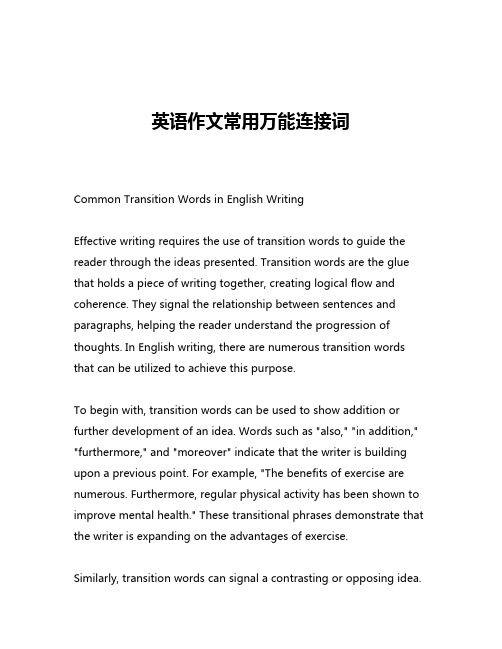
英语作文常用万能连接词Common Transition Words in English WritingEffective writing requires the use of transition words to guide the reader through the ideas presented. Transition words are the glue that holds a piece of writing together, creating logical flow and coherence. They signal the relationship between sentences and paragraphs, helping the reader understand the progression of thoughts. In English writing, there are numerous transition words that can be utilized to achieve this purpose.To begin with, transition words can be used to show addition or further development of an idea. Words such as "also," "in addition," "furthermore," and "moreover" indicate that the writer is building upon a previous point. For example, "The benefits of exercise are numerous. Furthermore, regular physical activity has been shown to improve mental health." These transitional phrases demonstrate that the writer is expanding on the advantages of exercise.Similarly, transition words can signal a contrasting or opposing idea."However," "on the other hand," "in contrast," and "conversely" are useful for introducing a contradictory perspective or highlighting a difference. Consider the sentence, "Jogging is an excellent form of cardiovascular exercise. However, it can be hard on the joints for some people." The transition word "however" alerts the reader that a counterargument is about to be presented.Transition words can also be employed to show cause and effect relationships. "As a result," "consequently," "therefore," and "thus" are effective in demonstrating how one idea or action leads to another. For instance, "Eating a healthy, balanced diet can boost the immune system. Consequently, individuals who maintain good nutrition are less susceptible to illness." These transitional phrases clarify the logical connection between the two statements.Furthermore, transition words can be utilized to indicate time or sequence. "First," "second," "next," "then," and "finally" are helpful in organizing ideas chronologically and guiding the reader through a series of steps or events. An example would be, "First, mix the dry ingredients in a large bowl. Next, add the wet ingredients and stir until well combined. Finally, pour the batter into a greased baking pan." The transition words make the step-by-step instructions clear and easy to follow.In addition, transition words can serve to provide examples orillustrations. "For instance," "for example," "specifically," and "in particular" are useful for introducing supporting details that elaborate on a main point. Consider the sentence, "Many popular tourist destinations are known for their unique cuisine. For example, Thailand is famous for its flavorful curries and noodle dishes." The transition phrase "for example" signals that the writer is about to give a specific case that exemplifies the preceding statement.Transition words can also indicate a summary or conclusion. "In summary," "overall," "in conclusion," and "ultimately" signal to the reader that the writer is synthesizing the key points or making a final statement. For instance, "Overall, the use of transition words is essential for creating coherent and well-organized writing. Ultimately, these linguistic tools help guide the reader through the author's ideas and arguments." These transitional phrases indicate that the writer is providing a summary or final thoughts on the topic.Moreover, transition words can be utilized to show a shift in focus or direction. "In terms of," "regarding," and "with respect to" can be used to introduce a new subtopic or change the emphasis of the discussion. For example, "Regarding the impact of technology on education, many schools have implemented one-to-one device programs." The transition "regarding" signals that the writer is now addressing a different aspect of the topic.Additionally, transition words can be employed to indicate a level of importance or emphasis. "Significantly," "in particular," and "especially" can be used to highlight a crucial point or draw the reader's attention to a specific detail. Consider the sentence, "Significantly, studies have shown that getting enough sleep is crucial for cognitive function and mental well-being." The transition word "significantly" underscores the importance of the information that follows.In conclusion, the strategic use of transition words is an essential element of effective English writing. These linguistic tools help create logical flow, guide the reader through the progression of ideas, and enhance the overall coherence of a piece of writing. By incorporating a variety of transition words, writers can effectively communicate their thoughts and arguments in a clear and organized manner. Whether signaling addition, contrast, cause and effect, time, example, summary, shift, or emphasis, transition words are the glue that holds a well-crafted essay or article together.。
新目标英语七年级上册-连词
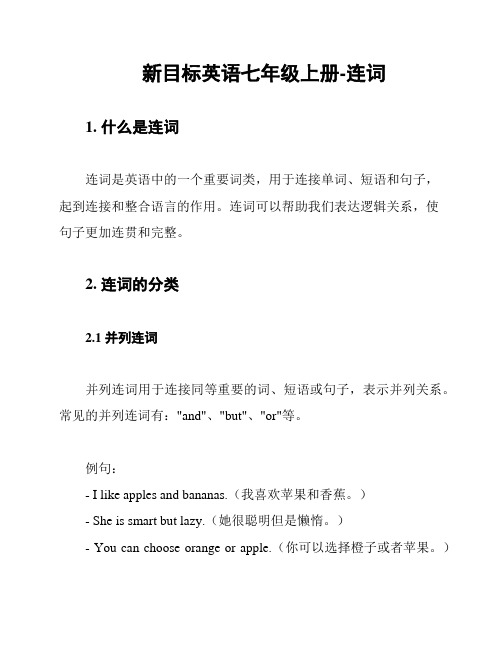
新目标英语七年级上册-连词1. 什么是连词连词是英语中的一个重要词类,用于连接单词、短语和句子,起到连接和整合语言的作用。
连词可以帮助我们表达逻辑关系,使句子更加连贯和完整。
2. 连词的分类2.1 并列连词并列连词用于连接同等重要的词、短语或句子,表示并列关系。
常见的并列连词有:"and"、"but"、"or"等。
例句:- I like apples and bananas.(我喜欢苹果和香蕉。
)- She is smart but lazy.(她很聪明但是懒惰。
)- You can choose orange or apple.(你可以选择橙子或者苹果。
)2.2 从属连词从属连词用于连接一个主句和一个从句,表示从属关系。
常见的从属连词有:"because"、"if"、"when"等。
例句:- I can't go out because it's raining.(我不能出去因为下雨。
)- If you study hard, you will succeed.(如果你努力研究,你会成功。
)- I'll call you when I get there.(我到达那里时会给你打电话。
)2.3 连接副词连接副词用于连接两个句子或短语,表示因果、条件、时间等关系。
常见的连接副词有:"however"、"therefore"、"meanwhile"等。
例句:- She studied hard; however, she failed the exam.(她努力研究,然而却没通过考试。
)- He didn't work hard; therefore, he didn't get promoted.(他没有努力工作,因此没有升职。
新概念英语第二册连词课件
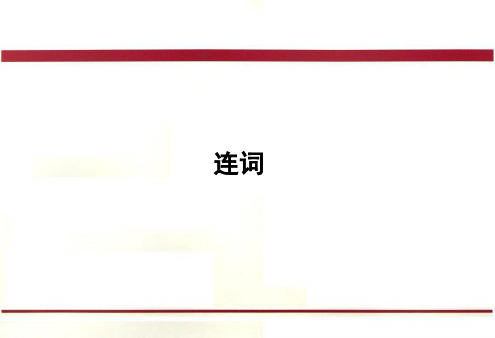
7.引导地点状语从句的主要有 where 等。
Go back where you came from. (where 引导地点状语从句) Go back to the village where you came from.(where 引导定语从句,修 饰 village)
8.引导比较状语从句的主要有 than,as 等, 在 as(so)...as 中, 后一个 as 是连词,引导比较状语从句。
When you are learning English,use it,or you will lose it.
The shoes don't fit me.They're either big or small.
考 点二 从属连词
1. 引导名词性从句的主要有 that(无词义,可省略), if 和 whether,后两者可与 or not 连用,他们在句中不作成分, 在 ask,wonder,not know, want to know,not be sure 等后常 用 whether 或 if 从句,而不用 that 从句。
The sports meeting will continue unless it rains this afternoon.
5.引导目的状语从句的主要有 so that,in order that 等。 He left early in order that he would arrive on time.
6.引导让步状语从句的主要有 even if,even though,(although)though 等。but 和(although)though 不能同时出现在一个句子中。although 比 though 更正式。
英语中的连接词
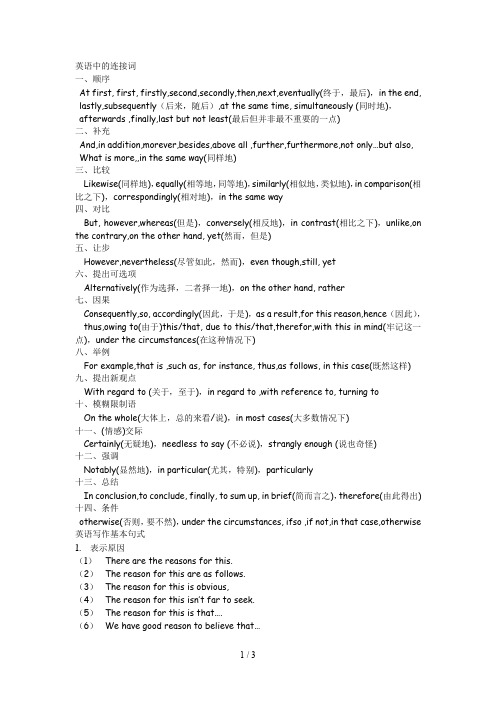
英语中的连接词一、顺序At first, first, firstly,second,secondly,then,next,eventually(终于,最后),in the end, lastly,subsequently(后来,随后),at the same time, simultaneously (同时地),afterwards ,finally,last but not least(最后但并非最不重要的一点)二、补充And,in addition,morever,besides,above all ,further,furthermore,not only…but also, What is more,,in the same way(同样地)三、比较Likewise(同样地),equally(相等地,同等地),similarly(相似地,类似地),in comparison(相比之下),correspondingly(相对地),in the same way四、对比But, however,whereas(但是),conversely(相反地),in contrast(相比之下),unlike,on the contrary,on the other hand, yet(然而,但是)五、让步However,nevertheless(尽管如此,然而),even though,still, yet六、提出可选项Alternatively(作为选择,二者择一地),on the other hand, rather七、因果Consequently,so, accordingly(因此,于是),as a result,for this reason,hence(因此),thus,owing to(由于)this/that, due to this/that,therefor,with this in mind(牢记这一点),under the circumstances(在这种情况下)八、举例For example,that is ,such as, for instance, thus,as follows, in this case(既然这样) 九、提出新观点With regard to (关于,至于),in regard to ,with reference to, turning to十、模糊限制语On the whole(大体上,总的来看/说),in most cases(大多数情况下)十一、(情感)交际Certainly(无疑地),needless to say (不必说),strangly enough (说也奇怪)十二、强调Notably(显然地),in particular(尤其,特别),particularly十三、总结In conclusion,to conclude, finally, to sum up, in brief(简而言之),therefore(由此得出) 十四、条件otherwise(否则,要不然),under the circumstances, ifso ,if not,in that case,otherwise 英语写作基本句式1.表示原因(1)There are the reasons for this.(2)The reason for this are as follows.(3)The reason for this is obvious,(4)The reason for this isn’t far to seek.(5)The reason for this is that….(6)We have good reason to believe that…e.g. There are three reasons for the changes that have taken place in our life,Firstly, people’s living standard has been greatly improved.Secondly,most people are well paid,and they can afford what they need or st but not least,more and more people prefer to enjoy modern life.2. 表示好处(1)It has the following advantages.(2)It dows us a lot of good.(3)It benefits us quite a lot.(4)It is beneficial/of great benefit ot us.e.g. Books are our friends.They can help us know the world better, and they can poen our minds and widen our horizons.Therefor,reading extensively is of great benefit to us.3. 表示坏处(1)It has more disadbantages than advantages.(2)It does us much harm.(3) I t’s harmful to us.e.g However,everything divides into two.Television can also be harmful to us .It can do harm to our health and make us lazy if we spend too much time watching TV.4.表示重要,必要,困难,方便,可能(1)I t’s important/necessary/difficult/convenient/possible for sb. to do sth.(2)We think it necessary to do sth.(3)It plays an important role in our life.e.g. Computers are now being used everywhere,whether in the government ,in school or in business. Soon, comupters will be found in every home,too. We have good reasons to say that computers are playing an increasingly important role in our life and we have steppend into the Computer Age.5.表示措施(1)We should take some effective measure.(2)We should do oure utmost in +V.-ing(3)We should solve the problems that we are confronted/faced with.(4)We should try our best to overcome/conquer the difficulties.e.g. The housing problem that we are confronted with is becoming more and more serious.Therefore, we must take some effective measures to solve it.6.表示变化(1)Some changes have taken place in the past five years.(2) A great change will certainly be produced in the world’s communication.(3)The computer has brought about many changes in education.e.g. Some changes have taken place in people’s diet in the past 5 years.The majoy reasons for these changes aren’t far to seek.Nowadays, more and more people are switching frome grain to meat for protein,and from fruit and vegetalbe to milk for vitamins.7.表示事实,现状(1)We can’t ignore the fact that..(2)No one can deny the fact that…(3)There is no denying the fact that…(4)However,tha t’s not the case.(5)This is a phenomenon that many people are interested in.e.g. We can’t ignore the fact that industrialization brings with it the problems of pollution.To solve these problems,we can strat by educating the public about the hazard of pollution.The government on its part should also desigh stricter laws to promote a cleaner environment.8.表示看法(1)People have(take,adopt,assume) different attitudes towards sth.(2)People have different opinions on this problem/take different views of (on) …(3)Some people believe that… Other argues that…e.g. People have different attitudes towards failure.Some believe that failure leads to success at their renewed endeavor.However, others are easily discouraged by failures and put themselves into the category of losers.9.表示结论(1)In short, it can be said that….(2)It may be briefly summed up as follows(3)From what has been mentioned above,we can come to the conclusion that…e.g. From what has…tha examination is necessary ,however, its method should be improved.[例(1)可用于任何一个段落结论句,例(3)则多用于文章结论段首句] 10.套句(1)It’s well known to us that…(2) As is known to us.(3)This is a topic that is being widely talked about.(4)From the graph(table,chart) listed above,it can be seen that…(5)As a proverb says,”Where there is a will, there is a way.”e.g. As is well known to us ,it’s important for the students to know the world outside campus.The reasone for this is bovious.Nowadays,the society is changing and developing rapidly, and the campus is no longer an “viory tower”.As college student, we must get in touch with the world outside the campus.Only in this way can we adapt oursevles to the socity quickly after we graduate.※一个段落有时宜以问句结尾e.g. ①Do lucky numbers bring good luck?Different people have different views on it.②Does it pay to be honest?This is a topic that is being widely talked about and different people have different opinions on it.。
- 1、下载文档前请自行甄别文档内容的完整性,平台不提供额外的编辑、内容补充、找答案等附加服务。
- 2、"仅部分预览"的文档,不可在线预览部分如存在完整性等问题,可反馈申请退款(可完整预览的文档不适用该条件!)。
- 3、如文档侵犯您的权益,请联系客服反馈,我们会尽快为您处理(人工客服工作时间:9:00-18:30)。
《新目标》英语连结词总结
中考英语最高档作文要求:有效地使用了语句之间的连接成分,使全文结构紧凑。
行文连贯是区分书面表达水平的重要标志之一。
但是,很多同学在写作中却往往忽视这一点。
如何做到行文连贯?其中的一个技巧就是恰当使用连结词。
一. 报告要点/描述时间过程
1. 开始陈述
to begin with, to start with, let’s begin with, first of all, in the first place, above all, at first
I thought today was going to be really bad. To start with, it was raining, and rainy days make me sad.
I don’t agree that animals should live in the zoo. To begin with, /First of all...... they have no freedom ...
At first, I thought it might be a d og, but I can’t see a dog ...
2. 顺序列点/显示事件的先后顺序
firstly/secondly/thirdly; first/second/third
then, next, after this, after that, before this, before that
First I need your name and address. Second, when’s your birthday?
He even handed out advertisements at a local supermarket. Then he told the teachers at school about this problem, ...
3. 表示另外,还有
what’s more, besides, also, in addition, still
No, I can’t have any pets because my mother hates them. Besides, our apartment is too small.
Also, pigs need a lot of love.
Still, it’s a great place to visit I’m lucky to be here for my six-month English course.
4. 结束陈述
finally, lastly, in the end
First cut three bananas, three apples and a watermelon. Next put the fruit in a bowl. Then put in two teaspoons of cinnamon and a cup of yogurt. Finally mix it all up.
二. 提供例子
1. like
Some champions, like the golfer Tigerwoods, make billions of dollars a year.
2. such as
All the restaurants have famous food from Holland, such as cheese.
3. for example
Lillian Li, for example, said that the best way to learn new words was by reading English magazines.
4. for instance
5. let’s say
三. 表示转折关系
1. but
She used to be short, but now she is tall.
2. however
However, life with a pig isn’t al ways perfect.
3. yet
4. instead
5. on the other hand
6. on the contrary
The young man didn’t enjoy his old job. On the contrary, he finds the new job very interesting.
四. 表示因果关系
因为:
1. because
He also thinks that watching English mov ies isn’t a bad way because he can watch the actors say the words.
2. as
3. since
因为,所以
1. so
2. therefore
3. so that
五. 表示条件关系
1. if
2. unless
表示让步关系
though
It does have a few good features, though.
although
I’m havi ng a great time in HongKong, although I have to be honest and say that I prefer Shanghai.
Although tea wasn’t brought to the Western world until 1610 ...
六. 表示时间关系
1. when
When I was young, I used to have so much time ...
2. while
3. before
Before I started high school, I used to spend a lot of time playing games with my friends ... 4. until/not ...until
Although tea wasn’t brought to the Western world until 1610...
5. by the time
By the time I got there, the bus had already left.
6. as soon as
7. later
Later, he (ShenNung) decided to taste the hot mixture.
8. soon
9. since
10. from now/then on
七. 换一种方法表述。
1. in other words
2. that is to say
八. 用于陈述事实。
1. in fact
...I love it. In fact, I think it’s pro bably my favorite.
2. to tell you the truth
显示资料来源
according to
According to an ancient Chinese legend the emperor ShenNung discovered tea when he was boiling drinking water over an open fire.
改变话题
by the way
as for
九. 对一个话题进行总结。
1. in short
2. all in all
3. in a word。
